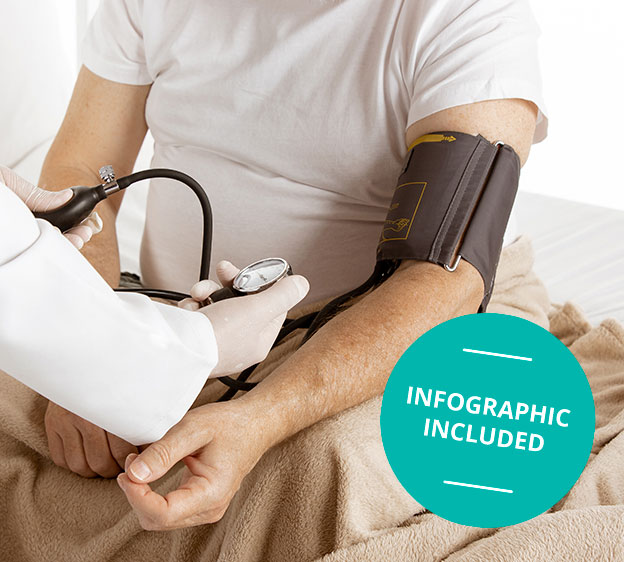
Your heart works hard every day, but it doesn’t always speak up when it’s experiencing problems. To learn if your heart is struggling, you can use different measurements to monitor your heart’s function. Two common (and commonly confused) indicators of potential problems are heart rate and blood pressure.
- Heart rate is the number of times your heart beats per minute.
- Blood pressure is the force of blood flowing through your blood vessels.
Read More: Your Mighty Heart
It’s possible to have a high or low heart rate without it affecting your blood pressure, and having high blood pressure doesn’t necessarily mean your heart rate is too high or too low. But there are some relationships between the two, and understanding those can help you protect your heart for the long term.
Heart Rate: What It Can Tell You
A healthy adult’s resting heart rate (the number of heart beats per minute when your body is at rest, you’re not ill and you feel calm) generally ranges from 60 to 100 beats per minute, but it could be higher or lower depending on your lifestyle and other factors.
“People who exercise frequently have lower resting heart rates. Whereas stress, diet, caffeine intake, poor sleep and taking certain medications can cause your heart rate to become elevated,” says Tara Kay, PA-C, a board-certified physician assistant at Beaufort Memorial Heart Specialists. “Generally, a lower heart rate is healthier as it allows your heart to pump more blood with each beat, which results in more efficient heart function.”
Changes in your resting heart rate may indicate a cardiac condition that should be examined by a doctor. Those conditions include:
- Bradycardia: Bradycardia is a condition in which your heart beats too slowly, usually less than 60 beats per minute but possibly lower depending on your age and current health. Left untreated, bradycardia can cause high or low blood pressure.
- Tachycardia: This is a condition in which your heart beats too fast, usually over 100 beats per minute but, again, is variable based on your age and health status. Different forms of tachycardia can impact your heart and overall health in different ways. Some forms increase your risk of chest pain and cardiac arrest, others indicate health problems such as anemia and thyroid issues, and still others can cause changes in blood pressure.
It's a good idea to keep an eye on your heart rate and alert your doctor if you notice changes.
Blood Pressure: An Important Indicator of Heart Health
Every time your heart beats, the resulting pressure pushes blood through your blood vessels. Your blood pressure is a measure of the blood’s force against the artery walls and is represented by two numbers in a fraction:
- Systolic pressure — the top number that tells you the pressure of blood pumping out of the heart and into your arteries
- Diastolic pressure — the bottom number that tells you your blood pressure between heartbeats
High blood pressure, also called hypertension, occurs when the force of the blood flowing through your blood vessels is too high. Over time, high blood pressure stresses the heart and causes it to work less efficiently, which can lead to serious issues such as heart attacks and strokes.
How to Keep Your Heart Rate and Blood Pressure in Healthy Ranges
Healthy lifestyle habits can go a long way toward lowering your blood pressure and preventing heart disease. This includes scheduling regular appointments with a primary care provider. You can manage heart health at home with these tips:
- Eat a healthy diet. A diet rich in fresh fruits, vegetables, lean protein sources and whole grains — and low in salt — can keep your blood pressure in a healthy range. Avoid caffeine, alcohol and tobacco if you have a history of tachycardia. Tobacco also raises blood pressure.
- Exercise. Physical activity can help lower high blood pressure and keep your heart rate strong.
- Stress less. Stress can impact your blood pressure and increase your heart rate.
“Combined aerobic and resistance exercise have proven to be one of the primary keys to overall health, longevity and especially cardiovascular health,” Kay stresses. “Regular exercise decreases heart rate, heart rate recovery time and can even reduce the risk of cardiac arrhythmias. Exercise also lowers blood pressure and can reduce the risk of developing hypertension.”
Read More: 10 Steps to a Healthier Heart
Heart rate and blood pressure aren’t the only numbers that can tell you if your heart is healthy. Learn other important indicators of heart health in our infographic.

Monitor your heart health for the future. Request a vascular screening.

